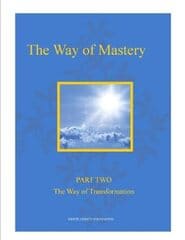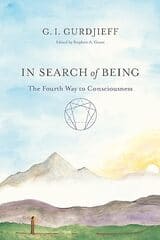T15-7 必要のない犠牲
自分自身を、またほかの人を、不幸な犠牲者と見ているかぎりは、神のパートナーにはなれません。”新たな契約”はあなたに、神の王国を自分のハートの中に認めることを求めています。それはつまり、神があなたと分離しているという考えを拒否するということでもあります。
自分が、あるいは兄弟が、愛に値しないという考えを拒否してください。悪とは恐怖心の中で生み出された考えだとして拒否してください。神の力を濫用しうるなどという考えを拒否してください。
・・・
神を再び人生に受け入れれば、この世界及びそこに住む者との経験すべては、すっかり変わってしまいます。あなたは近寄ってくるすべての子どもの父親であり母親であり、近寄ってくる老人の息子、娘となります。友だちの多い人にも孤独な人にも、友だちとなります。自分が愛されていることを覚えている人をも、それを忘れた人をも愛します。
あなたの愛に満ちた存在と神の愛の実践が必要とされないような場所はありません。すべての場所があなたの優しい言葉を呼び求めています。あなたが渇きを癒す杯(さかずき)から一緒に飲むことをすべての者たちが待ち望んでいます。

イエス・キリスト(Paul Ferrini ポール・フェリーニ著「無条件の愛 キリスト意識を鏡として」より)























It is very difficult also to sacrifice one's suffering.
自分の苦悩を犠牲に捧げることもまたとても困難なことだ。
A man will renounce any pleasures you like but he will not give up his suffering.
人は自分が好きなどんな快楽でも手放すが、自分の苦悩だけは手放そうとしないものだからだ。

George Ivanovich Gurdjieff
グルジエフ










It is difficult to free fools from the chains they revere.
愚か者たちが宝のように尊ぶ鎖から彼らを解放するのは困難なことだ。

Voltaire
ヴォルテール

テキストから犠牲についての一節をご紹介します。
真の犠牲の意味とは?の参考に、テキストから「必要のない犠牲」についての一節をご紹介します。
レッスン323「私は喜んで、恐れを『犠牲』にする」、T3-1 贖罪には犠牲は無用も参考になると思います。

無用な犠牲
7.「Yet this is what he thinks he wants.
それにもかかわらず、その人は、相手のために自分を犠牲にすることが自分の望みだと思っているのです。
He is not in love with the other at all.
その人は相手のことをまったく愛してなどいません。
He merely believes he is in love with sacrifice.
彼は単に、犠牲を払うことを正しいと思い込んで自分に酔いしれているだけです。
And for this sacrifice, which he demands of himself, he demands that the other accept the guilt and sacrifice himself as well.
そして、彼は自分自身に求めた犠牲を払うのだから、彼の払う犠牲に対して相手は罪悪感を抱くべきだし、彼と同じように相手も自分を犠牲にすべきだと要求します。」
家族関係や恋愛関係では、愛情との混同で、自分の犠牲に対して相手に罪悪感を抱かせようとする意識はわかりにくく埋没してしまいがちです。
これに対して、職場の人間関係などでの場の雰囲気、同僚が残業しているときの「お先に失礼しまーす」と帰りづらい空気は、露骨に無意味な犠牲を捧げている感覚が実感できる素材です。

テキスト 第十五章
VII. The Needless Sacrifice
七 必要のない犠牲
1. Beyond the poor attraction of the special love relationship, and always obscured by it, is the powerful attraction of the Father for His Son.
特別な愛情関係の皮相な魅力によってつねに不明瞭にされてはいるものの、特別な愛情関係の向こう側には、父なる神が神の子を強力に引き寄せる力が存在します。
There is no other love that can satisfy you, because there is no other love.
あなたを満足させられる愛はこれしかありません。なぜなら、神の愛以外の愛は存在しないからです。
This is the only love that is fully given and fully returned.
神の愛こそ完全に与えられ、完全に報われる唯一の愛です。
Being complete, it asks nothing.
完全なものなので、神の愛は何も求めません。
Being wholly pure, everyone joined in it has everything.
完全に純粋なので、神の愛の中で結ばれた者は、誰もみなあらゆるものを持っています。
This is not the basis for any relationship in which the ego enters.
神の愛は、エゴが入りこむいかなる関係の基盤にもなりません。
For every relationship on which the ego embarks is special.
なぜなら、エゴが関わりを持とうとする関係はひとつ残らず特別なものだからです。
2. The ego establishes relationships only to get something.
エゴはただ何かを手に入れるためにだけ、多様な関係を作り出します。
And it would keep the giver bound to itself through guilt.
そして、エゴは罪悪感を抱かせることで、その何かを与えてくれる相手をエゴ自身に縛りつけておこうとします。
It is impossible for the ego to enter into any relationship without anger, for the ego believes that anger makes friends.
エゴには、怒りを抜きにしては、どんな関係を結ぶことも不可能です。なぜなら、エゴは怒りによって味方を作り出せると信じているからです。
This is not its statement, but it is its purpose.
エゴは、関係性に怒りを持ちこむことで味方を作れると考えているとは言明しません。しかし、エゴがそれを目的にしているのは確かです。
For the ego really believes that it can get and keep by making guilty.
なぜなら、エゴは、相手に罪悪感を抱かせることで自分は何かを手に入れてそれを保つことができると本当に信じているからです。
This is its one attraction; an attraction so weak that it would have no hold at all, except that no one recognizes it.
罪悪感こそ、エゴが持つ唯一の魅力です。その魅力はあまりに弱いので実はまったく何の力も持ち合わせていないのですが、誰もこのことに気づきません。
For the ego always seems to attract through love, and has no attraction at all to anyone who perceives that it attracts through guilt.
というのは、エゴはいつも愛によって惹きつけるように思えるからです。しかし、エゴは罪悪感を梃(てこ)にして引き寄せるのだとわかっている者にとっては、エゴはまったく何の魅力も持ちません。

3. The sick attraction of guilt must be recognized for what it is.
罪悪感の魅力が病んだものであることをありのままに認識する必要があります。
For having been made real to you, it is essential to look at it clearly, and by withdrawing your investment in it, to learn to let it go.
なぜなら、あなたは実際に罪悪感に魅入られているので、罪悪感の病んだ本質をはっきりと見極めて、罪悪感に浸ることに自分の思いを注ぎこむのをやめることによって罪悪感を去らせる術を身につけることが絶対に必要だからです。
No one would choose to let go what he believes has value.
誰も、価値を持つと自分が信じているものを自ら進んで手放すことを選ぼうとはしません。
Yet the attraction of guilt has value to you only because you have not looked at what it is, and have judged it completely in the dark.
しかし、あなたにとって罪悪感の魅力が価値を持つのは、単に、あなたが罪悪感が何なのかしっかり見据えることなく、まったくの闇の中でその価値を判断してきたからでしかありません。
As we bring it to light, your only question will be why it was you ever wanted it.
私たちが罪悪感を光の下にもたらせば、あなたは、自分はなぜこんなものを欲しがっていたのだろうかと、ただ不思議に思うばかりでしょう。
You have nothing to lose by looking open-eyed, for ugliness such as this belongs not in your holy mind.
目を開いて見ることによってあなたが失うものなど、何ひとつありません。なぜなら、こんなにも醜悪なものは、あなたの神聖な心にふさわしくないからです。
This host of God can have no real investment here.
神を宿すあなたの神聖な心には、真に自分の思いを注ぎこむに足りる対象をこの幻想世界の中に見出せるはずがないのです。
4. We said before that the ego attempts to maintain and increase guilt, but in such a way that you do not recognize what it would do to you.
以前に話したことですが、エゴは罪悪感を抱き続けさせて増殖させようと企てるものの、この企てを、罪悪感があなたに何をするのかあなたに気づかせないような方法でやってのけます。
For it is the ego's fundamental doctrine that what you do to others you have escaped.
それというのも、あなたが他者に何かをすることで、あなたはその何かを免れることができるという原理がエゴの根本的な基盤だからです。
The ego wishes no one well.
エゴが誰かの幸福を願うことなどありません。
Yet its survival depends on your belief that you are exempt from its evil intentions.
しかし、エゴが生き残れるかどうかは、エゴの邪悪な目論見から自分だけは免れていると、あなたが信じてくれるかどうかにかかっています。
It counsels, therefore, that if you are host to it, it will enable you to direct its anger outward, thus protecting you.
そこでエゴは、もしあなたがエゴを宿してくれるなら、エゴはあなたがエゴの怒りの矛先を外側に向けられるようにさせて、そうすることで、あなたを守ってやれるとあなたに助言します。
And thus it embarks on an endless, unrewarding chain of special relationships, forged out of anger and dedicated to but one insane belief; that the more anger you invest outside yourself, the safer you become.
こうして、エゴは、終わることも報われることもない特別な関係の鎖をつなぎはじめます。この特別な関係の鎖は、怒りから作り出されたもので、あなたが自分以外の外部に向けて怒りを投げつければ投げつけるほど、あなたはより安全になれるというひとつの狂気の信念にだけ奉仕します。

5. It is this chain that binds the Son of God to guilt, and it is this chain the Holy Spirit would remove from his holy mind.
神の子を罪悪感に縛りつけているのはこんな鎖であり、聖霊が神の子の神聖な心から外そうと意図しているのもこの鎖です。
For the chain of savagery belongs not around the chosen host of God, who cannot make himself host to the ego.
なぜなら、選ばれた神の宿し主は、残忍さの鎖を巻きつけられるような存在ではなく、自らをエゴの宿主にすることなどできないからです。
In the name of his release, and in the Name of Him Who would release him, let us look more closely at the relationships the ego contrives, and let the Holy Spirit judge them truly.
神の子を解放するために、彼を解放しようとする聖霊の大いなる名をもって、私たちでエゴが引き入れようと謀る諸々の関係をもっとしっかりと見たうえで、聖霊にそれらの関係を正しく裁いてもらいましょう。
For it is certain that if you will look at them, you will offer them gladly to Him.
なぜなら、もしあなたがエゴの企むそれらの関係を本気で見てみるなら、あなたは喜んでそんな関係を聖霊に渡す気になるはずだからです。
What He can make of them you do not know, but you will become willing to find out, if you are willing first to perceive what you have made of them.
聖霊がそれらの特別な関係をどんなものに変容させることができるのか、あなたにはわかりません。しかし、もしあなたが何をさておきエゴの企む関係から自分が何を作り出してしまったのか見てみる気になりさえすれば、あなたは進んで聖霊が特別な関係をどのようなものに変えてくれるのか知りたいと思うようになるはずです。
6. In one way or another, every relationship the ego makes is based on the idea that by sacrificing itself, it becomes bigger.
結局のところ、エゴが作り出す関係はどれもみな、自分自身を犠牲に捧げることによってエゴがより大きくなることができるという考えに基づいています。
The "sacrifice," which it regards as purification, is actually the root of its bitter resentment.
エゴは「犠牲」を払うことが浄罪になるとみなします。しかし、実際には、この犠牲は、エゴが痛烈な恨みを抱く根源となります。
For it would prefer to attack directly, and avoid delaying what it really wants.
というのも、エゴはできるものなら直接的に攻撃して、自分が真に欲するものを手に入れるのを遅らせたくないと思っているからです。
Yet the ego acknowledges "reality" as it sees it, and recognizes that no one could interpret direct attack as love.
もっとも、エゴは、エゴなりに「現実」を認めており、誰も直接的な攻撃を愛と解釈しないはずだと認識しています。
Yet to make guilty is direct attack, although it does not seem to be.
しかし、そうは見えないだけで、罪悪感を抱かせることは直接的な攻撃なのです。
For the guilty expect attack, and having asked for it they are attracted to it.
というのは、罪悪感を抱く者は攻撃を予期することになり、攻撃を求めているがゆえに、攻撃に惹きつけられてしまうからです。

7. In such insane relationships, the attraction of what you do not want seems to be much stronger than the attraction of what you do want.
そんな狂気の関係の中にいると、自分の望まないものの魅力のほうが自分の本当に望むものの魅力よりもずっと強いように思えてきます。
For each one thinks that he has sacrificed something to the other, and hates him for it.
なぜなら、各自が互いに、自分は相手のために何かを犠牲にしてきたと思い、そのことで相手を憎んでいるからです。
Yet this is what he thinks he wants.
それにもかかわらず、その人は、相手のために自分を犠牲にすることを自分は望んでいると思っているのです。
He is not in love with the other at all.
その人は相手のことをまったく愛してなどいません。
He merely believes he is in love with sacrifice.
彼は単に、愛の美名の下に犠牲を払うことに自分が酔いしれている状態を愛と誤信しているだけです。
And for this sacrifice, which he demands of himself, he demands that the other accept the guilt and sacrifice himself as well.
そして、彼は自分自身に求めた犠牲を払うのだから、彼の払う犠牲に対して相手は罪悪感を抱くべきだし、彼と同じように相手も自分を犠牲にすべきだと要求します。
Forgiveness becomes impossible, for the ego believes that to forgive another is to lose him.
相手を赦すことはその相手を失うことだとエゴは信じているので、赦しは不可能になります。
It is only by attack without forgiveness that the ego can ensure the guilt that holds all its relationships together.
赦すことなく攻撃することによってしか、エゴは自らの関わるすべての関係を結びついたまま維持するための罪悪感を確保することができないのです。
8. Yet they only seem to be together.
しかし、エゴの関わる関係にある者同士は一緒にいるように見えているだけです。
For relationships, to the ego, mean only that bodies are together.
というのも、エゴにとっては、関係を結ぶことは、単に身体と身体が一緒にいることだけを意味するからです。
It is always this that the ego demands, and it does not object where the mind goes or what it thinks, for this seems unimportant.
エゴが要求するのはつねに身体と身体が一緒にいることだけで、心がどこに行こうが心が何を考えようが、そんなことはエゴにとってはどうでもいいことなので、エゴはそれに異議を唱えようともしません。
As long as the body is there to receive its sacrifice, it is content.
そこに身体があってエゴの犠牲を受け入れてくれさえすれば、エゴはそれで満足なのです。
To the ego the mind is private, and only the body can be shared.
エゴにとっては、心は個人に属するプライベートなものであり、ただ身体だけが分かち合えるものだからです。
Ideas are basically of no concern, except as they bring the body of another closer or farther.
その想念が他者の身体を自らに近づけるか遠ざけるかということを除いては、エゴは基本的に想念には何の関心も持ちません。
And it is in these terms that it evaluates ideas as good or bad.
だから、エゴが良い想念だと評価したり、悪い想念だと評価したりするのは、身体的な距離への影響という観点においてなのです。
What makes another guilty and holds him through guilt is "good. "
相手に罪悪感を抱かせて、罪悪感を通じて相手をつなぎとめるのが「良い」想念です。
What releases him from guilt is "bad," because he would no longer believe that bodies communicate, and so he would be "gone. "
相手を罪悪感から解放してしまうのは「悪い」想念です。なぜなら、その人はもはや身体同士がコミュニケーションをとるとは信じなくなるので、その結果として、その人は「去って」しまうからです。

9. Suffering and sacrifice are the gifts with which the ego would "bless" all unions.
苦悩と犠牲は、エゴがすべての結びつきを「祝福」するための贈り物です。
And those who are united at its altar accept suffering and sacrifice as the price of union.
そして、エゴの祭壇で結ばれる者たちは、自分たちが結ばれるための代償として苦悩と犠牲を受容します。
In their angry alliances, born of the fear of loneliness and yet dedicated to the continuance of loneliness, each seeks relief from guilt by increasing it in the other.
孤独への恐れから生じながらも、孤独を継続することに利用され続ける怒りの同盟の中では、各自が相手の抱く罪悪感を増大させることで自分の抱く罪悪感から解放されて楽になろうとします。
For each believes that this decreases guilt in him.
というのも、各自が、そうすることで自分の抱く罪悪感を減らすことができると信じているからです。
The other seems always to be attacking and wounding him, perhaps in little ways, perhaps "unconsciously," yet never without demand of sacrifice.
おそらく些細なことで、そして、おそらく「無意識」に、しかし必ず犠牲を要求しながら、相手はつねに自分のことを攻撃したり傷つけたりしているように思えてきます。
The fury of those joined at the ego's altar far exceeds your awareness of it.
エゴの祭壇で結ばれた者たちの憤怒は、あなたがそれを意識している程度をはるかに凌ぐものです。
For what the ego really wants you do not realize.
なぜなら、あなたはエゴが何を本当に望んでいるのかわかっていないからです。
10. Whenever you are angry, you can be sure that you have formed a special relationship which the ego has "blessed," for anger is its blessing.
あなたが怒っているときには必ず、あなたは、自分がエゴの「祝福」する特別な関係を形成してしまったものと考えて間違いありません。なぜなら、怒りこそエゴの祝福だからです。
Anger takes many forms, but it cannot long deceive those who will learn that love brings no guilt at all, and what brings guilt cannot be love and must be anger.
怒りは多様な形をとります。しかし、愛はまったく罪悪感をもたらすことがないので、罪悪感をもたらすなら、それは愛ではなく怒りに違いないと学んだ者たちを、そう長くは怒りが欺き続けることはできません。
All anger is nothing more than an attempt to make someone feel guilty, and this attempt is the only basis the ego accepts for special relationships.
あらゆる怒りは、誰かに罪悪感を抱かせようとする試みにほかなりません。そして、ただこんな試みだけが、特別な関係をエゴが受け入れる唯一の根拠なのです。
Guilt is the only need the ego has, and as long as you identify with it, guilt will remain attractive to you.
罪悪感こそエゴが唯一必要とするものであり、あなたがエゴと一体化しているかぎり、罪悪感はあなたにとって魅惑的なものであり続けるでしょう。
Yet remember this; to be with a body is not communication.
しかし、これだけは覚えておいてください。それは、身体と一緒にいることがコミュニケーションになるわけではないということです。
And if you think it is, you will feel guilty about communication and will be afraid to hear the Holy Spirit, recognizing in His Voice your own need to communicate.
もしあなたが身体と一緒にいることがコミュニケーションであると思うなら、あなたはコミュニケーションを行うことに罪悪感を抱き、聖霊に耳を貸すことを恐れるようになってしまいます。なぜなら、あなたは聖霊の大いなる声の中に、コミュニケーションをとる自らの必要性に気づくことになるからです。

11. The Holy Spirit cannot teach through fear.
聖霊は、恐れを通して教えることはできません。
And how can He communicate with you, while you believe that to communicate is to make yourself alone?
あなたがコミュニケーションをとると自分が孤独になってしまうと信じているというのに、どうして聖霊があなたとコミュニケーションできるというのでしょうか。
It is clearly insane to believe that by communicating you will be abandoned.
コミュニケーションをとることによって自分が見捨てられてしまうと信じるなど、明らかに狂気の沙汰です。
And yet many do believe it.
それでも、多くの者は、コミュニケーションをとると自分が見捨てられてしまうと信じています。
For they think their minds must be kept private or they will lose them, but if their bodies are together their minds remain their own.
というのも、彼らは、自分の心を自分だけの内密なものとして保っておかなければ、自分は自分の心を失ってしまうけれど、自分たちの身体と身体を一緒にしておきさえすれば、自分の心を自分だけのものにしておけると思いこんでいるからです。
The union of bodies thus becomes the way in which they would keep minds apart.
こうして、身体同士を結合させることが、心と心を別々に分離しておくための方法となります。
For bodies cannot forgive.
なぜなら、身体は赦すことなどできないからです。
They can only do as the mind directs.
身体は、心の指図する通りに行動することしかできません。
12. The illusion of the autonomy of the body and its ability to overcome loneliness is but the working of the ego's plan to establish its own autonomy.
身体には自律性があり、孤独を克服する能力が身体にはあると錯覚することは、自らの自律性を確保するためにエゴが立てた計画の作用にすぎません。
As long as you believe that to be with a body is companionship, you will be compelled to attempt to keep your brother in his body, held there by guilt.
身体的に一緒にいることが他者と交流することだとあなたが信じているかぎり、あなたは罪悪感によって兄弟を彼の身体に縛りつけて身体の中に閉じこめておこうとせずにはいられないでしょう。
And you will see safety in guilt and danger in communication.
そして、あなたは罪悪感を抱いていれば安全で、コミュニケーションを図るのは危険だと思うようになります。
For the ego will always teach that loneliness is solved by guilt, and that communication is the cause of loneliness.
というのも、エゴはつねに孤独は罪悪感によって解消でき、コミュニケーションは孤独の原因であると教えるからです。
And despite the evident insanity of this lesson, many have learned it.
こんなエゴの教えが狂っていることは歴然としています。それにもかかわらず、多くの者はこのように学んでしまっているのです。

13. Forgiveness lies in communication as surely as damnation lies in guilt.
罪悪感を抱くことで地獄を味わうのと同じくらい確実に、コミュニケーションをとることで赦すことができます。
It is the Holy Spirit's teaching function to instruct those who believe communication to be damnation that communication is salvation.
コミュニケーションは天罰を招く呪詛であると信じる者に、コミュニケーションこそが救いであると教えるのが聖霊の教えの役目です。
And He will do so, for the power of God in Him and you is joined in a real relationship so holy and so strong, that it can overcome even this without fear.
そして、聖霊はその役目を果たしてくれるでしょう。なぜなら、聖霊とあなたの中にある神の力は真の関係としてひとつに結ばれており、そのつながりはあまりに神聖で強力なものなので、コミュニケーションが罰を呼ぶ呪いであるとの信念さえも恐れることなく克服することができるからです。
14. It is through the holy instant that what seems impossible is accomplished, making it evident that it is not impossible.
神聖な瞬間を通じて不可能と思えることが成就するので、それが不可能ではないことが明らかになります。
In the holy instant guilt holds no attraction, since communication has been restored.
神聖な瞬間の中では、罪悪感は何の魅力も保つことができません。なぜなら、そこではコミュニケーションが回復されているからです。
And guilt, whose only purpose is to disrupt communication, has no function here.
そして、罪悪感はコミュニケーションを混乱させることだけを目的とするので、神聖な瞬間において罪悪感には、何の役目もありません。
Here there is no concealment, and no private thoughts.
神聖な瞬間においては、秘密にしておくことのできるものなど何もないし、自分だけの個人的な思いなどひとつもありません。
The willingness to communicate attracts communication to it, and overcomes loneliness completely.
コミュニケーションをしたいという意欲自体がコミュニケーションを引き寄せ、孤独を完全に克服します。
There is complete forgiveness here, for there is no desire to exclude anyone from your completion, in sudden recognition of the value of his part in it.
神聖な瞬間には完全な赦しがあります。というのは、神聖な瞬間においては、あなたの完成のためにほかの者たちが果たす役割の重要性に即座に気づくことになるので、あなたの完成から誰ひとりとして排除したいという願望がなくなるからです。
In the protection of your wholeness, all are invited and made welcome.
あなたの完全性に守られて、すべての者たちが招かれ歓迎されます。
And you understand that your completion is God's, Whose only need is to have you be complete.
そして、神が唯一必要としているのはあなたが完全なものになることだけなので、あなたは自分を完全にすることが神を完成させることになるのだと理解します。
For your completion makes you His in your awareness.
なぜなら、あなたが完全になることで、あなたは神の完成を自覚できるようになるからです。
And here it is that you experience yourself as you were created, and as you are.
そして、ここに至って、あなたは自分自身を創造されたままの姿として、そして、あるがままの自分として体験するのです。












